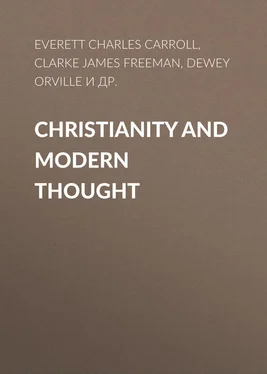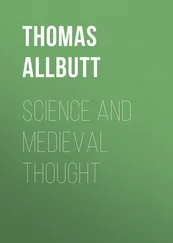Andrew Peabody - Christianity and Modern Thought
Здесь есть возможность читать онлайн «Andrew Peabody - Christianity and Modern Thought» — ознакомительный отрывок электронной книги совершенно бесплатно, а после прочтения отрывка купить полную версию. В некоторых случаях можно слушать аудио, скачать через торрент в формате fb2 и присутствует краткое содержание. Жанр: foreign_antique, foreign_prose, на английском языке. Описание произведения, (предисловие) а так же отзывы посетителей доступны на портале библиотеки ЛибКат.
- Название:Christianity and Modern Thought
- Автор:
- Жанр:
- Год:неизвестен
- ISBN:нет данных
- Рейтинг книги:5 / 5. Голосов: 1
-
Избранное:Добавить в избранное
- Отзывы:
-
Ваша оценка:
- 100
- 1
- 2
- 3
- 4
- 5
Christianity and Modern Thought: краткое содержание, описание и аннотация
Предлагаем к чтению аннотацию, описание, краткое содержание или предисловие (зависит от того, что написал сам автор книги «Christianity and Modern Thought»). Если вы не нашли необходимую информацию о книге — напишите в комментариях, мы постараемся отыскать её.
Christianity and Modern Thought — читать онлайн ознакомительный отрывок
Ниже представлен текст книги, разбитый по страницам. Система сохранения места последней прочитанной страницы, позволяет с удобством читать онлайн бесплатно книгу «Christianity and Modern Thought», без необходимости каждый раз заново искать на чём Вы остановились. Поставьте закладку, и сможете в любой момент перейти на страницу, на которой закончили чтение.
Интервал:
Закладка:
I mean the Theology which places the substance above the form; the thing before the name; which looks at the fact, not at the label.
Let us then, brethren, who call ourselves Unitarians, be glad and grateful for the gospel of faith and hope which we enjoy. And let us give to others what we have ourselves received. If it be true, as we have tried to show, that human progress depends largely on a true Theology we cannot help mankind more than by diffusing widely that which God has given us of his truth. Freely you have received, freely give. You who have always lived in this community, surrounded by this mellow warm light of peace and freedom, do not know, cannot tell, what those suffer who have been taught from early childhood to fear God, and to distrust his light in their soul. Do your part in spreading abroad the beams of a better day. Give to the world that religion which is not a spirit of fear, but of power, and of love, and of a sound mind.
THE RISE AND DECLINE OF THE ROMISH CHURCH
We live in a time of great and manifold changes. There is one church that for centuries has had her principal glory in asserting that she never has changed, – that she has at all times been exactly the same; but now she can hardly deny that either in accordance with her own will, or by the force of circumstances, very great changes have been wrought in her during the last few years. This, if it is true, must change also the nature, the system, the course of our controversy with her. The controversy between the two churches has not always, perhaps, been quite fair; and I should not like to be unfair to any adversary, whoever he may be. I should not be at ease in my conscience if I thought I had been unfair to any thing, especially to any thing religious, of whatever kind that religion may be; because in any religion, even the most imperfect, there is some aspiration from this earth to the sky; at least, from human souls to what they hope or believe to be God. And especially I could not pardon myself for being in any way unjust to that great church which has for centuries comforted and sustained a multitude of souls, and made them better and happier by her teachings. It is a Christian church; and though I think that Romish Christianity has been in a very great degree alloyed, and mixed with grave errors, – and that is exactly what I wish to show, – yet, even under that veil of human errors, I recognize, I acknowledge, religion, Christianity; and therefore I bow before it.
I think, however, the changes that have taken place have not altered the essential character of the Roman Church. I think the changes that have happened are in conformity with the nature of that church; really were to be expected, and have nothing absolutely new in them. We might, perhaps, for a long time have seen them coming; and, if we had had foresight enough, we might have seen them from the very first times of that church. Let us try to understand exactly what she is, what she means; let us try to see what there is under that name, "Roman Catholic Church." She calls herself catholic , which means universal , and at the same time she has a local name. She is for the whole world; but at the same time she belongs to one city, and she bears the name of that city. Why? This is the question; and though it seems only a question of name, I think we shall find by other ways that it is a question of facts. A second advance requires a change in our polemics with Roman authority. A new science has been created in our time, which gives us better means of judging and studying other churches than our own; that science is called the comparative history of religions. In England Max Müller, in France Burnouf, and in this country James Freeman Clarke, have compared the history of several religions. According to that comparative history, there are rules to be understood, to be acknowledged, in the development of religion. One of the rules which I think we can deduce from any comparative history of religion may be a startling one; and I will use a very homely comparison, to make myself perfectly understood. Have you ever seen over a shop door a sign-board, where the name of the old shop-keeper was painted; and, when his successor came in, he had the same board covered with a new color, and his own name painted over the old one? But in time the new paint wore off, so that the old name reappeared under the new, in such a way that it became perhaps difficult to distinguish clearly which letters or lines belonged to the old, and which to the new. If this image appears somewhat too familiar, let me ask you if you remember what scholars call a palimpsest. Sometimes in the Middle Ages it was difficult to find well-prepared parchment on which to write, and there were a great many monks who had nothing else to do – and it was the best use they could make of their time – but write or copy the Bible or other religious books. When they found parchments where were copied the comedies and tragedies or other works of the heathen, they thought those were of very little use, and they could very easily have the writing on those parchments washed out, or covered over with white paint, in such a way that what had been written there was no more visible. Then on those parchments they would write the Bible, or sermons, or any document they thought useful. But the same thing happened then that happened with the sign-board, – the old writing reappeared after a time; the white covering spread over the page disappeared. And thus it happens that scholars are sometimes pondering for a long time over a page from a sermon of Saint Augustine, or John Chrysostom, in which they find a verse from some comedy of Terence or Aristophanes; then they have perhaps some trouble in making out which is comedy and which is sermon, in distinguishing exactly what of the writing is old and what is new; and they have not always perfectly succeeded in that effort.
Now what we see in the sign-board we see also in the religion of the different churches, when a whole multitude, at one time, pass from one worship to another. Then, against their will, and perhaps without their knowing it, they never come into the pale of their new church empty-handed: they carry with them a number of ideas, and habits, and turns of thought, which they had found in their old worship. And thus, after a time, when the fervor of the early days is over, you find in the new religion, or new worship, a real palimpsest: the old one is reappearing under the new. That makes itself manifest in a good many ways; sometimes in ways the most strange and unexpected.
If you ask me, now, remembering this rule, what means the name, "Roman Catholic Church," I answer: Christianity absorbed into itself the Roman empire; the Roman empire became Christian in a very few years, with a most rapid, with a most admirable sway; souls became conquered in large numbers; they became Christian. But afterwards it appeared that they were not so perfectly unheathenized as they were thought to be, or as they thought themselves: many of their heathenish habits of life, thoughts, and customs remained even in their very worship. Thus, after Christianity had absorbed the Roman world, it appeared that the Roman world had penetrated and impregnated the whole of Christianity; and this is the Roman Catholic Church. She is Christian, but she is full of the errors and superstitions that belonged to the old Roman heathenish world.
To understand what this means we must now try to comprehend what the old Roman genius was. Here I ask you not to confound it with the Greek genius, which was in many respects highly superior, but which had, at that time, passed away in a large measure, and been replaced everywhere by the Roman genius. What were the especial traits of character of the Romans? The first, and a very striking one to those who have travelled and studied in those countries, is a most vivacious love for tradition. In Rome, at the present day, you find things that are done, that are said, that are believed, that are liked, because they were two thousand years ago, without the people themselves having a very clear notion of it. Their custom – and it is born in their flesh, and in their blood – is to look backwards, and to see in the past the motives and the precedents for their acts and for their belief. Of this I could quote to you a number of instances. I will choose but one. The first time I was in Rome I stopped, as every traveller does, on the Piazza del Popolo . In the midst of that square is an obelisk, and on one side of the pedestal of that obelisk is written: "This monument was brought to Rome by the High Pontiff, Cæsar Augustus." I went round the monument, and on the other face of the same pedestal I read: "This monument, brought to Rome by the High Pontiff, Cæsar Augustus, was placed in this square by the High Pontiff, Sextus V." And then I remembered that one of those High Pontiffs was a Roman heathen, an Emperor; and that the other was a Christian, was a priest, was a pope; and I was astonished, at first sight, to find on two faces of the same stone the same title given to those two representatives of very different religions. Afterwards, I observed that this was no extraordinary case, but that in many other places in Rome instances of the same kind were to be found. I inquired a little more deeply, perhaps, than some other travellers, into the meaning of those words. I asked myself why this pope, Sextus V., and this Emperor Augustus, should each be called "pontiff." What is the meaning of "pontiff"? "Pontiff" means bridge-maker, bridge-builder. Why are they called in that way? Here is the explanation of that fact. In the very first years of the existence of Rome, at a time of which we have a very fabulous history, and but few existing monuments, – the little town of Rome, not built on seven hills as is generally supposed; there are eleven of them now; then there were within the town less than seven even, – that little town had a great deal to fear from any enemy which should take one of the hills that were out of town, the Janiculum, because the Janiculum is higher than the others, and from that hill an enemy could very easily throw stones, fire, or any means of destruction, into the town. The Janiculum was separated from the town by the Tiber. Then the first necessity for the defence of that little town of Rome was to have a bridge. They had built a wooden bridge over the Tiber, and a great point of interest to the town was that this bridge should be kept always in good order, so that at any moment troops could pass over it. Then, with the special genius of the Romans, of which we have other instances, they ordained, curiously enough, that the men who were a corporation to take care of that bridge should be sacred; that their function, necessary to the defence of the town, should be considered holy; that they should be priests, and the highest of them was called "the high bridge-maker." So it happened that there was in Rome a corporation of bridge-makers, pontifices , of whom the head was the most sacred of all Romans, because in those days his life, and the life of his companions, was deemed necessary to the safety of the town. Things changed; very soon Rome was large enough not to care about the Janiculum; very soon Rome conquered a part of Italy, then the whole of Italy, and finally almost the whole of the world. But when once something is done in Rome, it remains done; when once a thing is said, it remains said, and is repeated; and thus it happened that the privilege of the bridge-makers' corporation, as beings sacred and holy, remained; and that privilege made everybody respect them; gave them a sort of moral power. Then kings wanted to be made High Bridge-makers; after kings, consuls; later, dictators; and, later, emperors themselves made themselves High Bridge-makers, which meant the most sacred persons in the town.
Читать дальшеИнтервал:
Закладка:
Похожие книги на «Christianity and Modern Thought»
Представляем Вашему вниманию похожие книги на «Christianity and Modern Thought» списком для выбора. Мы отобрали схожую по названию и смыслу литературу в надежде предоставить читателям больше вариантов отыскать новые, интересные, ещё непрочитанные произведения.
Обсуждение, отзывы о книге «Christianity and Modern Thought» и просто собственные мнения читателей. Оставьте ваши комментарии, напишите, что Вы думаете о произведении, его смысле или главных героях. Укажите что конкретно понравилось, а что нет, и почему Вы так считаете.












